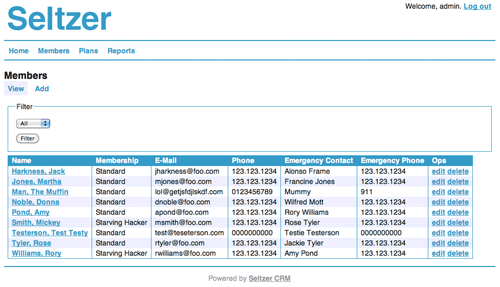A graceful end to Seltzer development

The Kickstarter I’ve been running for Seltzer (a tool for managing cooperatives) finished last night, at just shy of 1/3 of the funding goal. While the project wasn’t successfully funded, the crowdfunding campaign was far from a failure.
Over the past few weeks, I’ve learned an incredible amount about who is actually interested in Seltzer, and how much they’re able to participate. I received dozens of encouraging messages from organizers and administrators telling me how much they needed software like Seltzer. And I'm incredibly grateful to everyone who did pledge money to the project. I know many people stretched themselves to give generously. But, in the end, it wasn't enough to fund the project. Several people have told me I should have done an Indiegogo so I’d still get the money that was pledged, but here’s the secret: the campaign was as much about gauging interest as it was about raising money. The main goal of Seltzer has never been to create an application with a specific set of features, but to cultivate an open source community that could work together on an application that meets their common needs. No amount of money can buy that. Now I know that the time isn’t right, and I can apply myself more effectively elsewhere.
So what specifically did I learn? I had expected most of the support to come from people and organizations that were already using Seltzer or at least knew what it was, but I found just the opposite, which might mean that the existing version is actually good enough for everyone using it. I’d also expected many more small-dollar donations but was surprised to see that I got more $40 donations than $10 or $20. Data management isn’t sexy, so I realize now that those small dollar donations needed a more exciting reward to overcome the "sign into Kickstarter" activation energy.
I’d also expected more support from existing hackerspaces, both in the form of larger pledges and encouraging members to make smaller pledges. Members of a few spaces did take this on, but not as many as I’d planned on. The biggest challenge was establishing and maintaining contact. If I could do it again, I’d have started reaching out to hackerspaces months earlier and held regular calls to keep the momentum going. Volunteer organizations move slowly, and are easily distracted.
I’m a little sad that the campaign didn’t get funded, but it’s important to know when to end a project gracefully. So what does this mean for the future of Seltzer? Well, I won’t be developing a new version any time soon. Instead I’ll continue answering questions and reviewing bug-fixes, but no new features, on the existing version. Edit: And don't forget, you can still write your own modules to integrate with the existing code! I’ll also continue organizing people around cooperative software and linked data. If you want to be involved, join the cooperative software mailing list. I’ll also keep following exciting tech developments like JSON-LD. Who knows, maybe there will be a resurgence in interest for Seltzer later on, and I'd certainly consider another crowdfunding campaign, maybe over summer in some future year. In the meantime, it looks like I'll have four-day weekends for the rest of the this summer, so I should be able to relax a bit and catch up on reading and other side-projects.
Seltzer CRM

Over the past couple years, I've been developing a Customer Relationship Management app (CRM) for hackerspaces, and it's now ready to release into the wild! Meet Seltzer CRM!
Seltzer CRM is an open source (GPL) CRM web app for hackerspaces. It's based on the LAMP stack, and has been in use at i3 Detroit for a couple years, growing with us to our current level of 75 members.
There are plenty of CRMs out there already, and even some open source ones, but all of the ones I've come across are rather complicated and have a learning curve before people can use them productively. Seltzer CRM is built around two goals: 1. Be significantly useful to the average hackerspace administrator without any training; 2. Be easy for a typical hackerspace web dev to hack on and extend.
The current features are:
- Track member contact info
- Track current and historical membership levels
- Track keycard info
- Provide attendance and voting sheets
You can try a demo here:
http://elplatt.com/seltzertest (user: admin, pass: beexcellent)
And the code is on github:
http://github.com/elplatt/seltzer
